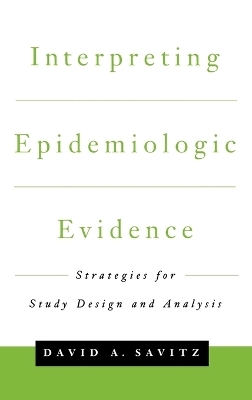
Interpreting Epidemiologic Evidence
Strategies for Study Design & Analysis
Seiten
2003
Oxford University Press Inc (Verlag)
978-0-19-510840-8 (ISBN)
Oxford University Press Inc (Verlag)
978-0-19-510840-8 (ISBN)
- Titel ist leider vergriffen;
keine Neuauflage - Artikel merken
This book offers a strategy for assessing epidemiologic research findings. Specific tools for assessing the presence and impact of selection bias in both cohort and case-control studies, bias from non-response, confounding, exposure measurement error, disease measurement error, and random error are identified and evaluated.
Evaluating the strength or persuasiveness of epidemiologic evidence is inherently challenging, both for those new to the field and for experienced researchers. There is a myriad of potential biases to consider, but little guidance about how to assess the likely impact on study results. This book offers a strategy for assessing epidemiologic research findings, explicitly describing the goals and products of epidemiologic research in order to better evaluate its successes and limitations. The focus throughout is on practical tools for making optimal use of available data to assess whether hypothesised biases are operative and to anticipate concerns at the point of study design in order to ensure that needed information is generated. Specific tools for assessing the presence and impact of selection bias in both cohort and case-control studies, bias from non-response, confounding, exposure measurement error, disease measurement error, and random error are identified and evaluated. The potential value of each approach as well as its limitations are discussed, using examples from the published literature.
Such information should help those who generate and interpret epidemiologic research to apply methodological principles more effectively to substantive issues, leading to a more accurate appraisal of the current evidence and greater clarity about research needs.
Evaluating the strength or persuasiveness of epidemiologic evidence is inherently challenging, both for those new to the field and for experienced researchers. There is a myriad of potential biases to consider, but little guidance about how to assess the likely impact on study results. This book offers a strategy for assessing epidemiologic research findings, explicitly describing the goals and products of epidemiologic research in order to better evaluate its successes and limitations. The focus throughout is on practical tools for making optimal use of available data to assess whether hypothesised biases are operative and to anticipate concerns at the point of study design in order to ensure that needed information is generated. Specific tools for assessing the presence and impact of selection bias in both cohort and case-control studies, bias from non-response, confounding, exposure measurement error, disease measurement error, and random error are identified and evaluated. The potential value of each approach as well as its limitations are discussed, using examples from the published literature.
Such information should help those who generate and interpret epidemiologic research to apply methodological principles more effectively to substantive issues, leading to a more accurate appraisal of the current evidence and greater clarity about research needs.
1. Introduction ; 2. The Nature of Epidemiologic Evidence ; 3. Strategy for Drawing Inferences from Epidemiologic Evidence ; 4. Selection Bias in Cohort Studies ; 5. Selection Bias in Case-Control Studies ; 6. Bias Due to Loss of Study Participants ; 7. Confounding ; 8. Measurement and Classification of Exposure ; 9. Measurement and Classification of Disease ; 10. Random Error ; 11. Integration of Evidence across Studies ; 12. Characterization of Conclusions
| Erscheint lt. Verlag | 1.7.2003 |
|---|---|
| Zusatzinfo | 6 figures and numerous tables |
| Verlagsort | New York |
| Sprache | englisch |
| Gewicht | 615 g |
| Themenwelt | Studium ► Querschnittsbereiche ► Epidemiologie / Med. Biometrie |
| ISBN-10 | 0-19-510840-X / 019510840X |
| ISBN-13 | 978-0-19-510840-8 / 9780195108408 |
| Zustand | Neuware |
| Haben Sie eine Frage zum Produkt? |
Mehr entdecken
aus dem Bereich
aus dem Bereich
ein überfälliges Gespräch zu einer Pandemie, die nicht die letzte …
Buch | Hardcover (2024)
Ullstein Buchverlage
24,99 €


